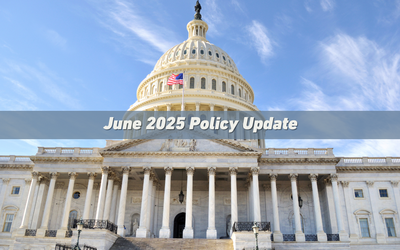
We are coming out of the fog of non-stop legislative work and happy to take a quick break to see what’s happening around the country!
The Chronic Disease Coalition has a broad agenda on issues of access, affordability, and representation. There were almost 1,500 bills filed on these issues, and even narrowing it down to our key states, there are still 488 bills to watch.
Eyes on Medicaid
The new Administration’s calls for major budget cuts to Medicaid have kept people's eyes on the federal level. Based on the bill passed by the House, our partners at MultiState tell us:
“Per modeling done by third-parties, the expectation is that most states that have implemented Medicaid expansion should be expected to face federal Medicaid revenue loss of up to 9 to 10 percent in the first year, with some states experiencing higher revenue loss.”
However, many Republican senators are expressing an unwillingness to make cuts at the same scale. The Washington Post reports that the public generally recognizes the need for Medicaid and understands that cuts will endanger people, families and communities, and the Senate appears to be listening.
Changes to the program and reductions in funding are probably inevitable, but details matter—and so do constituent voices. The time is right to let people know you support Medicaid and you support the elected officials who are willing to protect it.
We’ve drafted two different versions of a letter, so you can send the message that feels most comfortable to you. These letters are still completely customizable.
Medicaid for Strong Communities – The Medicaid program is needed to preserve independence and keep hospitals open; reform can still happen without hurting working families.
Preserving Progress with Medicaid – Medicaid successfully provides essential health coverage that stabilizes families, communities and local hospitals.
This is a federal problem this year, but will be a MAJOR state problem next year. We encourage you to reach out to both your federal and state elected officials in support of this program. Working families, those with disabilities, nursing home residents and many more are depending on us.
Prior Authorization (PA)
This is a major issue for chronic disease patients who are often forced (with their providers) to jump through hoops to get the right medication and treatments. Bills fell into a couple of main categories, with a lot of attention from our patients on the use of Artificial Intelligence (AI).
- Determination Timelines: Requiring insurers to respond to PA requests in a defined and more expedited manner.
- Gold Carding: Exempting physicians with a history of insurer approval from certain PA requirements.
- Artificial Intelligence: Limiting the use of AI in making adverse determinations.
- Transparency: Requiring insurers to approvals, denials and other PA data to the state.
Pharmacy Benefit Manager (PBM) Reform
The problems with PBMs received unexpected attention earlier this year when they were sharply criticized by President Trump. This may have made it more politically feasible to take on the conversation at the state level.
- Pricing Reforms & Transparency: Controlling excessive drug prices and ensuring that patients benefit from negotiated discounts. Includes spread pricing, mandating that rebates pass through to plan sponsors, and requires PBMs to operate with full transparency.
- Licensing & Oversight: Includes disclosure of ownership and management structure, fees, and enforcement authority.
- Pharmacy Ownership: Arkansas enacted a bill forbidding pharmacy ownership of PBMs, and a letter signed by 39 state Attorneys General was also recently sent to congressional leaders. We can also expect to see lawsuits filed.
Medigap Bills of Note
Medigap provides essential insurance coverage to people who have serious disabilities or illnesses such as end stage renal disease or amyotrophic lateral sclerosis (ALS). Requiring insurance companies to offer affordable plans helps keep people from having to go broke in order to qualify for Medicaid. What’s more, people waiting for kidney transplants need Medigap or similar plans to cover the cost of post-transplant care. Most people will never need a Medigap plan, but they are a lifeline to those who do.
- Enacted! VA HB 2100 & UT HB258: Enact a "Birthday Rule" allowing Medigap policyholders to switch to another insurer offering the same plan benefits without medical underwriting around the time of their birthday.
- Enacted! GA SB 5: Mandates Medicare supplement policies are issued on a guaranteed renewable basis under which the insurer shall be required to continue coverage so long as premiums are paid on such policy.
Sent To Governor! TX HB 2516: Requires an entity that offers a Medicare supplement benefit plan coverage to individuals over 65 to offer the same coverage to individuals who are under 65 and are enrolled in Medicare for end stage renal disease or ALS.
- Sent To Governor! NV SB 292: Requires insurers to allow people who are less than 65 years of age to purchase a Medicare supplemental policy.
Thank you to the hundreds of people who have answered our calls to action and engaged with their legislators. It’s those direct and relevant conversations that matter the most!